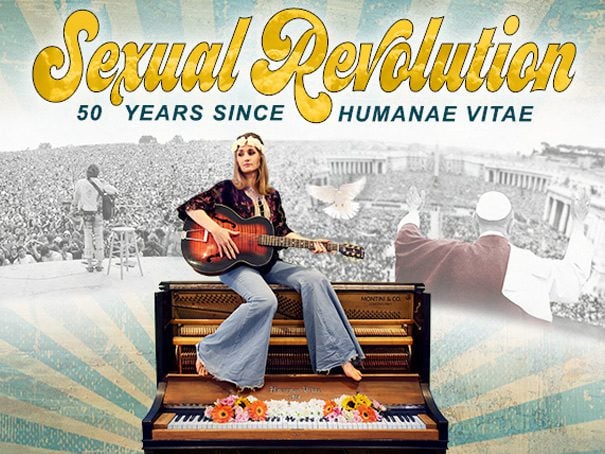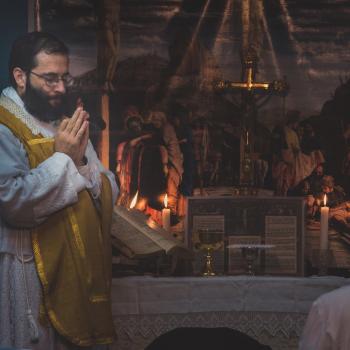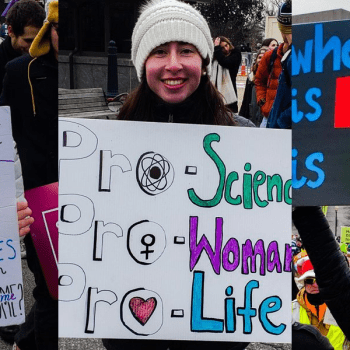 Recently, I had the opportunity to talk to Rickard Newman who is a convert to Catholicism and the writer and co-director of the movie “Sexual Revolution: 50 Years Since Humanae Vitae”.
Recently, I had the opportunity to talk to Rickard Newman who is a convert to Catholicism and the writer and co-director of the movie “Sexual Revolution: 50 Years Since Humanae Vitae”.
Me: Can you tell me a little about how you came to know the Catholic Church and its teachings on sexual morality?
Rickard: I grew up in Sweden and was baptized in the Lutheran Church, but we didn’t go to church, my faith was never fostered and I opted out before confirmation in my early teens.
In my late 20s, after several failed romantic relationships, I was longing for marriage, for somebody to start a family with. I had seen the Baby Boomers fail both with marriage and family life and my older friends weren’t doing any better. Since the definition of insanity is to do the same thing over and over and expect a different result, I realized I had to change environment which meant leaving Sweden to find influences from other cultures.
Sometimes when you take a leap of faith, God rewards you. Just days into this walkabout, I met the woman who is now my wife, Alana Newman, in New York City. She was also an atheist who, just a couple of years before we met, had volunteered for NARAL (an abortion rights group) and handed out Richard Dawkins “The God Delusion” to her friends as Christmas gifts.
We quickly started talking about marriage and children. I learned that she was donor-conceived and that she was trying to figure out how her conception had been related to her identity struggles. During this time of dating, we got to know some Catholics. It was, by the way, the first time in my life I had ever met a Catholic. They seemed to have an intelligent understanding of the issues we were wrestling with, which impressed me. It also became clear to us that the way they lived their lives made them happy. We wanted the joy we saw in these families and we said “Let’s emulate what they are doing, except the Christ part… because we’re not Christ people”. Well, God works with that too.
One day we accepted an invitation to go to Mass, and even though it was our first Mass it felt mysteriously familiar. It was like returning to the loving home of your grandparents, where you used to play as a toddler, but lack distinct memories from. Not long after, we realized that Christ is at the center of all that love we craved, and it has now been four years since we were received into the Catholic Church.
It was the Church teaching on sex, love and marriage that captured us. Theology of the Body, Love and Responsibility and Humanae Vitae were all instrumental, as well as the bold witnesses of Robert P George, Helen Alvare, Janet Smith, Peter Kreeft, Archbishop Chaput (all featured in the film) and many more. During this process, I was filming Alana’s journey, which included trying to find her biological father, converting, and having three kids. I had no idea of what would become of it at the time. It wasn’t until I stumbled upon the beautiful story of John and Evelyn Billings, the pioneers of modern Natural Family Planning, that I knew that we could make an intriguing documentary. I was thrilled when Springtime Productions, that last year made the movie about the Original Image of Divine Mercy, decided to produce it.
 Me: So you said that at the beginning the issue was third-party reproduction with your wife being donor-conceived. How would you contrast the views of the world and the Church in that regard?
Me: So you said that at the beginning the issue was third-party reproduction with your wife being donor-conceived. How would you contrast the views of the world and the Church in that regard?
Rickard: First of all, I didn’t know anything about third-party reproduction, so when we were dating and she told me, “I’m donor-conceived,” I didn’t know if I was supposed to say, “Congratulations,” or “I’m sorry”. I had to ask more questions.
I learned that her mother had used an anonymous sperm donor to conceive her, that she didn’t know who her biological father was, and that this had led to behavioral problems in her youth. In her early 20s, she had come across books like “Between Two Worlds: The Inner Lives of Children of Divorce” by Elizabeth Marquardt and David Blankenhorn’s “Fatherless America” and had realized that many of her issues was well documented by social science. When I met her, she had just started AnonymousUs, a story-collective for those affected by third-party reproduction, and began writing about her experiences as donor-conceived for the Institute for American Values.
The writing made her explore existential questions such as “What does it mean to be a human being?” “Where do we come from?” “What are we made for?” “What are the rights of children?”. Ask these questions with an open mind and heart, and you will find yourself on an interesting journey.
What we started to see, among other things, is how the world often sees children as means to an end. People who are suffering from sub- or infertility are made to think that “the cure” is IVF or surrogacy, but when you treat a child as an entitlement or a commodity that can be “acquired”, you are treating that child as a means to an end. So when using these practices, you’re in fact just transferring and multiplying your suffering, not transforming it. The Church in her love and wisdom knows this, and it shines through in the teachings of Paul VI and John Paul II and in the work of John and Evelyn Billings.
Me: For yourself, was there any other key point along this path where you saw the argument and you were just blown away by how the Church taught as opposed to how the world taught?
Rickard: I think the confidence in which the Catholic Church speaks of these topics impressed me. Contraception, abortion, casual sex and divorce are all regarded, where I come from, as holy grails – secular sacraments in a sense – and you don’t question them. To hear Catholics speak so unapologetic, articulate and confident about another way of looking at these things fascinated me. And this was not a way or a position that the Church had taken the last 5 or 50 years or so, but rather held for 2000 years. It would have been arrogant of me not to try to understand it better.
Me: How can people get in touch with you or see your movie?
The trailer is out now and the documentary will be released in June. We are making screenings available for dioceses, parishes, schools, organizations throughout 2018 – the 50th anniversary of Humanae Vitae. You can watch the trailer, learn more about the film and book a screening at www.sexualrevolution.com.
Note: Daniel DiSilva is the primary Director of this movie.
Here’s the trailer.












